User:MLFBackup/sandbox
To view election infoboxes, click this link to the other sandbox (Note: some are unrelated to the timeline): https://wiki.riteme.site/wiki/User:Crashguy42/sandbox
1957 and the Establishment of the Offices
[edit]1957-1960
[edit]Offices Held
[edit]| Offices Held after office switch | |||||||||||||||||||||||||||||
| Dwight D. Eisenhower | Richard Nixon | ||||||||||||||||||||||||||||
|---|---|---|---|---|---|---|---|---|---|---|---|---|---|---|---|---|---|---|---|---|---|---|---|---|---|---|---|---|---|
| President of Forgein Policy | President of Domestic Policy | ||||||||||||||||||||||||||||
 |
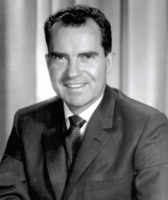 | ||||||||||||||||||||||||||||
| 1st United States President of Forgein Policy (1957–1961) |
1st United States President of Domestic Policy (1957–1961) | ||||||||||||||||||||||||||||
| Campaign | |||||||||||||||||||||||||||||
Then President and Vice President Eisenhower and Nixon took on the roles of Presidents of Domestic and Foreign Policy. At the time, no Vice Presidents were appointed.
Major Events
[edit]- House and Senate expansions for planned doubling of Representitaves and Senators.
1960-1970
[edit]1960
[edit]Incumbent President of Foreign Policy Dwight D. Eisenhower declined to run for re-election in 1960, citing his age and medical concerns. His deputy President, Richard M. Nixon, the incumbent President of Domestic Policy ran for re-election. Nixon was the first President in the, at the time, the short history of the office to introduce a Vice President. A staple of the former office. He chose Former Massachusettes Senator Henry Cabot Lodge Jr. Nixon/Lodge won re-election with no primary opposition.
| Office of Domestic Policy, 1960 | |||||||||||||||||||||||||||||
| Richard Nixon | Henry Cabot Lodge Jr. | ||||||||||||||||||||||||||||
|---|---|---|---|---|---|---|---|---|---|---|---|---|---|---|---|---|---|---|---|---|---|---|---|---|---|---|---|---|---|
| President of Domestic Policy | Vice President of Domestic Policy | ||||||||||||||||||||||||||||
 |
 | ||||||||||||||||||||||||||||
| 1st United States President of Domestic Policy (1957–1964) |
1st United States Vice President of Domestic Policy (1961–1964) | ||||||||||||||||||||||||||||
| Campaign | |||||||||||||||||||||||||||||
| Office of Foreign Policy, 1960 | |||||||||||||||||||||||||||||
| John F. Kennedy | Lyndon B. Johnson | ||||||||||||||||||||||||||||
|---|---|---|---|---|---|---|---|---|---|---|---|---|---|---|---|---|---|---|---|---|---|---|---|---|---|---|---|---|---|
| President of Forgein Policy | Vice President of Forgein Policy | ||||||||||||||||||||||||||||
 |
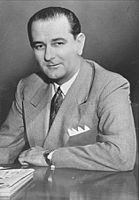 | ||||||||||||||||||||||||||||
| 2nd United States President of Foreign Policy (1961–1963) |
1st United States Vice President of Foreign Policy (1961-1963) | ||||||||||||||||||||||||||||
| Campaign | |||||||||||||||||||||||||||||
1963
[edit]
While on the first campaign swing of his re-election effort, President Kennedy was assassinated on November 22, 1963 in Dallas, Texas. Supporters were shocked and saddened by the loss of the charismatic President, while opposition candidates were put in the awkward position of running against the policies of a slain political figure.
During the following period of mourning, Republican leaders called for a political moratorium, so as not to appear disrespectful. As such, little politicking was done by the candidates of either major party until January 1964, when the primary season officially began. At the time, most political pundits saw Kennedy’s assassination as a way of leaving the nation politically unsettled.

After the assassination of President Kennedy, Vice President Johnson was sworn in under his predecessor's title in the early hours of 11/23/63. For months, security had increased for Presidents Johnson and Nixon, as well as Vice President Lodge and Nominee for 2nd United States Vice President of Foreign Policy, Hubert Humphrey.
| Office of Foreign Policy (After 11/22/63) | |||||||||||||||||||||||||||||
| Lyndon B. Johnson | Hubert Humphrey | ||||||||||||||||||||||||||||
|---|---|---|---|---|---|---|---|---|---|---|---|---|---|---|---|---|---|---|---|---|---|---|---|---|---|---|---|---|---|
| President of Forgein Policy | Vice President of Forgein Policy | ||||||||||||||||||||||||||||
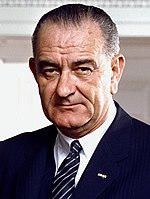 |
 | ||||||||||||||||||||||||||||
| 3rd United States President of Foreign Policy (1963–1964) |
2nd United States Vice President of Foreign Policy (1963–1964) | ||||||||||||||||||||||||||||
| Campaign | |||||||||||||||||||||||||||||
1964
[edit]In 1964, President of Domestic Policy Nixon established early in the year that he would not be running for re-election, However, He endorsed the incumbent President of Foreign Policy, Lyndon B. Johnson, to run for the seat. Johnson and Humphrey formally announced that he would retire his seat and run for Nixon's in late 1963. Johnson won Nixon's seat by a fairly large margin, with a few opposing ballots cast for George Wallace in light of the rising Vietnam War tensions and the fact he had supported equal rights.
Unlike Nixon's seat, Johnson's seat as President of Foreign Policy was highly contested. The top 4 candidates were Former Attorney General, Senator, and brother of President John F. Kennedy, Robert F. Kennedy, Governor Nelson Rockefeller of New York, Incumbent Vice President of Domestic Policy Henry Cabot Lodge Jr., and Senator Barry Goldwater of Arizona. The race was very close, as of 6 AM the day after election night, six states (Florida, Alaska, Kentucky, Iowa, Colorado, and Nevada) were still too close to be called. When all states were called, Kennedy won 253 Electoral Votes (The Majority,) Lodge with 150 EVs, Goldwater with 73 EVs, and Rockefeller with 62 EVs. Before the vote went to the House, Rockefeller withdrew, giving his electoral votes to Lodge. One elector from North Carolina also voted for Lodge instead of the state's winner, Kennedy. His final total was 213 EVs. In the House, the Democratically controlled Congress chose Kennedy to be President. Kennedy chose Eugene McCarthy as his Vice President of Foreign Policy.
| Office of the President of Domestic Policy | |||||||||||||||||||||||||||||
| Lyndon B. Johnson | Hubert Humphrey | ||||||||||||||||||||||||||||
|---|---|---|---|---|---|---|---|---|---|---|---|---|---|---|---|---|---|---|---|---|---|---|---|---|---|---|---|---|---|
| President of Domestic Policy | Vice President of Domestic Policy | ||||||||||||||||||||||||||||
 |
 | ||||||||||||||||||||||||||||
| 2nd United States President of Domestic Policy (1964-1968) |
2nd United States Vice President of Domestic Policy (1964–1968) | ||||||||||||||||||||||||||||
| Campaign | |||||||||||||||||||||||||||||
| Office of the President of Foreign Policy | |||||||||||||||||||||||||||||
| Robert F. Kennedy | Eugene McCarthy | ||||||||||||||||||||||||||||
|---|---|---|---|---|---|---|---|---|---|---|---|---|---|---|---|---|---|---|---|---|---|---|---|---|---|---|---|---|---|
| President of Forgein Policy | Vice President of Forgein Policy | ||||||||||||||||||||||||||||
 |
 | ||||||||||||||||||||||||||||
| 4th United States President of Foreign Policy (1964–1972) |
3rd United States Vice President of Foreign Policy (1964–1972) | ||||||||||||||||||||||||||||
| Campaign | |||||||||||||||||||||||||||||
Major Events
[edit]- Succsessful end of the unpopular Vietnam war under the Kennedy administration
1968
[edit]Major Events
[edit]- PFP Kennedy survives an assassination attempt while campaigning in California
1970-1980
[edit]1972
[edit]1976
[edit]1980-1990
[edit]1980
[edit]1984
[edit]1988
[edit]1990-2000
[edit]1992
[edit]1996
[edit]2000-Present
[edit]2000
[edit]Major Events
[edit]2004
[edit]Both President of Domestic Policy Al Gore (2000-2004) and President of Foreign Policy George W. Bush (1996-2004) declined to run for re-election. Joe Liberman failed to be nominated by the Democratic Party, instead choosing John Kerry (Primaries will be expanded on later.) Senators John Kerry and Barack Obama were elected as the President and Vice President of Domestic Policy, while Senators John McCain and Elizabeth Dole were elected as Presidents of Foreign Policy. Dole was the first woman to be elected Vice President in the history of either office of the Presidents Domestic and Foreign Policy, or the Presidency of the United States
2008
[edit]President of Domestic Policy John Kerry declined to run for re-election, Domestic Vice President Barack Obama was nominated and elected. John McCain was re-elected as the President of Foreign Policy.
Major Events
[edit]- May 2nd, 2011: The Mission that started in September 2001 to kill Osama Bin Laden, after the attacks on the World Trade Center and The Pentagon, had finally ended after a raid of his compound in Abbottabad, Pakistan.
U.S. presidential address
[edit]Also available: Audio only; Full text

At 11:35 p.m., Presidents Obama and McCain called a joint session of Congress to announce that Bin Laden was dead. Afterwards, At 12:50 a.m., President Obama appeared on major television networks:
Good evening. Tonight, I can report to the American people and to the world that the United States has conducted an operation that killed Osama bin Laden, the leader of al-Qaeda, and a terrorist who was responsible for the murder of thousands of innocent men, women, and children ...(cont'd)
President Obama remembered the victims of the September 11 attacks. In the early morning hours of May 3rd, 2011, President McCain, as well as Vice Presidents Biden and Dole, had released their statements to news sources and social media accounts.
2012
[edit]When the 2012 Presidential election came along, The President of Domestic Policy Barack Obama, along with Vice President Joe Biden, decided not to run for re-election, Instead, running against the Incumbent President of Foreign Policy, John McCain. The 2-term PFP John McCain lost the nomination to Obama, while the open Presidential seat is fought over by all parties, but is ultimately picked up by Former Governor Mitt Romney and U.S. Representative Paul Ryan. ticket beat the McCain/Dole ticket and was sworn in on January 20, 2012.
Election Candidates
[edit]- Former Governor Mitt Romney (R-MA)/U.S. Representative Paul Ryan. PV: 10,031,336 (42.1%)
- Domestic Policy Secretary of State Hillary Clinton (D-NY)/Senator Tim Kaine. PV: 8,493,836 (33.3%)
- Former Senator Rick Santorum (R-PA). PV:3,932,069 (8.7%)
- Former Speaker of the House of Representatives Newt Gingrich (R-GA). PV: 2,734,570 (8.4%)
- U.S. Representative Ron Paul (L-TX)/Former Governor Gary Johnson. PV: 2,095,795 (6.4%)
- Former Governor Gary Johnson (L-NM)/Judge James P. Gray. PV: 1,275,971 (.9%)
Major Events
[edit]- March 7th, 2011: McCain's failure to end the Iraq war, this is the main reason people attribute to McCain losing re-nomination.
- December 8th, 2012: President of Foreign Policy Obama ended the Iraq war
2016
[edit]The United States presidential election of 2016 was held on Tuesday, November 8, 2016. The Democratic ticket of former Secretary of State Hillary Clinton and U.S. Senator from Virginia Tim Kaine kept the position of POFP, previously held by Barack Obama, who declined to run for re-election. The Republican ticket of businessman Donald Trump and Indiana Governor Mike Pence kept the PODP office, previously held by Mitt Romney, who was defeated in the primaries for nomination of another term. Both incumbent Vice Presidents, Joe Biden and Paul Ryan declined to run. Clinton and Trump took office as the Foreign and Domestic Presidents, and Pence and Kaine as the Vice Presidents, on January 20, 2017. Concurrent with the presidential election, Senate, House, and many gubernatorial and state and local elections were also held on November 8. Clinton was the first woman to be elected President in the history of either office of the Presidents Domestic and Foreign Policy, or the Presidency of the United States
United States Presidential Election, 2020
[edit]The United States presidential election of 2020, is scheduled for Tuesday, November 3, 2020. Voters will elect new presidents and vice presidents or re-elect the incumbents. The series of presidential primary elections and caucuses are likely to be held during the first six months of 2020. This nominating process is also an indirect election, where voters cast ballots selecting a slate of delegates to a political party's nominating convention, who then, in turn, elect their party's presidential nominee.
President of Domestic Policy Donald Trump of the Republican Party and President of Foreign Policy Hillary Clinton of the Democratic Party, who were elected in 2016, will be eligible to seek re-election. The winners of the 2020 presidential election are scheduled to be inaugurated on January 20, 2021.
Both Clinton and Trump have started with historically low approval ratings, leading many to speculate opposition. While Clinton has stabilized a 65% Approval rating, PDP Donald Trump has had many controversies during his tenure and still has ratings as low as 35%. Some have speculated that he will lose re-election, or possibly resign, resulting in VP-PDP Mike Pence being sworn in.
Important Events
[edit]- 2017 Trump-Russia Investigation
- 2018 Federal Election Recall Bill Proposal
Republican Party
[edit]Donald Trump is eligible to run for re-election and has implied that he intends to do so. His reelection campaign is ongoing. On January 20, 2017 at 5:11 PM, he submitted a letter as a substitute of FEC Form 2, for which he had reached the legal threshold for filing, in compliance with the Federal Election Campaign Act.
Presumptive incumbents
[edit]| Name | Born | Current or previous positions | State |
|---|---|---|---|
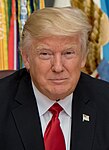 Donald Trump |
June 14, 1946 (age 78) New York City, New York |
United States President of Domestic Policy since 2017 Candidate for President of Domestic Policy in 2000 |
New York |
Mike Pence |
June 7, 1959 (age 65) Columbus, Indiana |
United States Vice President of Domestic Policy since 2017 Governor of Indiana 2013–2017 U.S. Representative 2001–2013 |
Indiana |
Below are other Republican candidates that may or will run in 2020:
Speculative candidates
[edit]- John Kasich, Governor of Ohio since 2011; U.S. Representative 1983–2001; candidate for President of Domestic Policy in 2000 and 2016
- Rand Paul, U.S. Senator from Kentucky since 2011; candidate for President of Domestic Policy in 2012 and 2016
- Paul Ryan, Former Vice President of Domestic Policy 2013-2017; 54th Speaker of the United States House of Representatives since 2017
Democratic Party
[edit]Hillary Clinton is also eligible to run for re-election, but it is unknown at this time if she intends to do so.
Presumptive incumbents
[edit]| Name | Born | Current or previous positions | State |
|---|---|---|---|
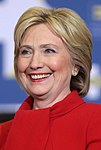 Hillary Clinton |
October 26, 1947 (age 76) New York City, New York |
United States President of Forgein Policy since 2017 Candidate for President in 2008 Junior Senator from New York 2001–2009 First Lady of the United States 1993–2001 |
New York |
 Tim Kaine |
February 26, 1958 (age 66) Saint Paul, Minnesota |
United States Vice President of Forgein Policy since 2017 Junior Senator from Virginia 2013–2016 Governor of Virginia 2006–2010 |
Virginia |
Below are other Democratic candidates that may or will run in 2020:
Candidates who have publicly expressed interest
[edit]Candidates in this section have expressed an interest in running for President within the last six months.
- Lincoln Chafee, Governor of Rhode Island 2011–2015; U.S. Senator 1999–2007; Republican nominee for the U.S. Senate in 2006; candidate for President in 2016
List:
Domestic: 1957-1960: Richard M. Nixon/None 1960-1964: Richard M. Nixon/Henry Cabot Lodge Jr. 1964-1968: Lyndon B. Johnson/Hubert Humphrey 1968-1972: George Romney/Ronald Reagan 1972-1976: Jimmy Carter/Eugene McCarthy 1976-1988: Ronald Reagan/Jack Kemp 1988-1992: Jack Kemp/Newt Gingrich 1992-2000: Bill Clinton/Michael Dukakis 2000-2004: Al Gore/Jay Nixon 2004-2008: John Kerry/Barack Obama 2008-2012: Barack Obama/Joe Biden 2012-2016: Mitt Romney/Paul Ryan 2016- : Mitt Romney/Mike Pence
Foreign:
1957-1960: Dwight D. Eisenhower/none
1960-1963: John F. Kennedy/Lyndon B. Johnson
1963-1964: Lyndon B. Johnson/None
1964-1972: Robert Kennedy/George McGovern
1972-1980: Gerald Ford/Nelson Rockefeller (1973-1979)
1980-1988: George H. W. Bush/Bob Dole
1988-1992: Lloyd Bentsen/Al Gore
1992-1996: Al Gore/Joe Lieberman
1996-2004: George W. Bush/Dick Cheney
2004-2012: John McCain/Elizabeth Dole
2012-2016: Barack Obama/Joe Biden
2016- : Hillary Clinton/Tim Kaine





